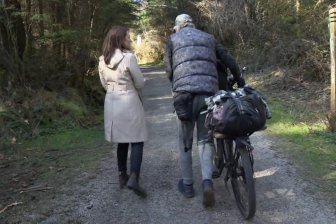A smoky skies bulletin has been issued for B.C.’s Southern Interior.

With smoke covering nearly all of the lower quarter of British Columbia, Environment Canada issued the health warning just before noon on Tuesday, stretching from Vancouver Island to the Kootenays.
According to the national weather agency, wildfire smoke from the U.S. is impacting air quality levels.
In the Central Okanagan, the day began with clear skies, but that quickly changed to a high, sun-filtering film of grey smoke.
At 9 a.m., the air quality index for Kelowna was rated at 2, or low, on their 1-10 scale. But by noon, that ratcheted up to the highest ranking at 10-plus.
It was the same in the South Okanagan, where the day began at a 3 but, at 1:30 p.m., hit 10-plus. At 2:30 p.m., the AQHI was rated at 10.
The North Okanagan is currently listed at 7.
Elsewhere, parts of Greater Victoria were rated at 6 and 7, while Duncan was at 8. The Fraser Valley was at 2, with Metro Vancouver ranging between 4 and 8.
For more about B.C.’s air quality health index, click here.

“During a wildfire, smoke conditions can change quickly over short distances and can vary considerably hour by hour,” health officials said in a press bulletin.
“Wildfire smoke is a natural part of our environment, but it is important to be mindful that exposure to smoke may affect your health.”
Health officials say during smoky conditions, follow common sense and to do the following:
• Stop or reduce your activity level if breathing becomes uncomfortable or you feel unwell.
• Stay cool and drink plenty of fluids.
• If you have asthma or other chronic illness, carry rescue (fast-acting) medications with you at all times.
• Make sure that children and others who cannot care for themselves follow the same advice.
Health officials say people respond differently to smoke, and that mild irritation and discomfort are common, and usually disappear when the smoke clears.
Further, officials say exposure to wildfire smoke and the virus that causes COVID-19 can both result in respiratory symptoms such as a dry cough, sore throat, or difficulty breathing.
For more about health and wildfire smoke, click here.
It’s unknown how long the smoky skies will remain. The next official update was set for Wednesday.
However, a website dedicated to wildfire smoke, FireSmoke.ca, was forecasting for the smoke to disappear by Wednesday.
To see that visual forecast, click here.





Comments